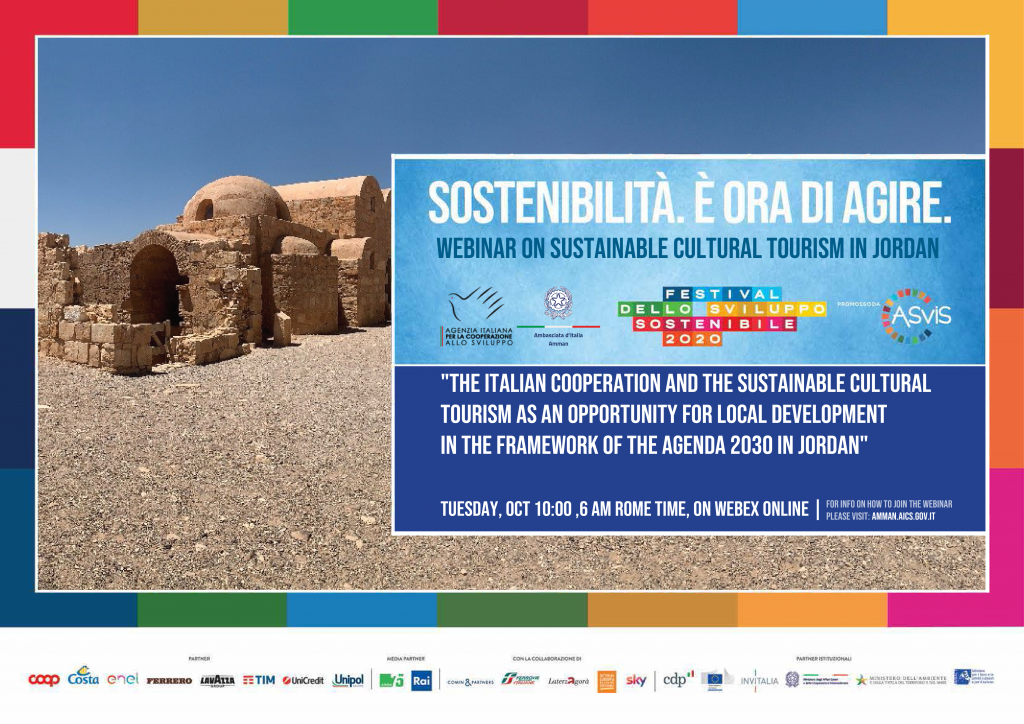AICS Amman at the Sustainable Development Festival on Tuesday, Oct 6, 10:00 am (Rome time)
The Sustainable Development Festival represents a further step to encourage Italy to achieve the 2030 Agenda. The Italian Alliance for Sustainable Development (ASviS), that brings together over 270 organizations from the economic and social spheres, organizes the Festival together with its members and with the support of the partners and tutors, over a period of 17 days, as many as the Sustainable Development Goals of the UN’s 2030 Agenda. The initiative constitutes a single widespread and inclusive event, comprising hundreds of events organized throughout the national territory.
The Webinar focuses on discussing the complex relations between culture, heritage, sustainability and tourism. It displays the different methods and trending strategies for preserving, spreading, and improving cultural and architectural heritage for the following decades. Provided that the tourism sector is becoming more and more willing to engage in the sustainable development scheme, key concepts and topics shape this Webinar’s agenda starting with different interventions in Jordan funded by the Government of Italy.

“Sustainable cultural tourism is the integrated management of cultural heritage and tourism activities in conjunction with the local community creating social, environmental and economic benefits for all stakeholders, to achieve tangible and intangible cultural heritage conservation and sustainable tourism development”.
From the beginning of time, human movement and settlement patterns were solely dependent on basic human needs such as food, water, and trade. Today, and as we progressed into the 20th and 21st Centuries, these factors continue to influence patterns of the diaspora in different forms and with different motivations such as education, social betterment, and financial restrictions that were all usually coupled with necessity. However, in the contemporary and developed world, essential travel developed into a widespread activity of the masses supported by diverse services. As a leisure activity, Tourism represents an exchange of culture and plays a significant role in understanding the world we live in. Within the framework of the Sustainable Development Goals (SDGs) adopted in September 2015 by the United Nations, the international development agenda refers to culture for the first time. The safeguarding and promotion of culture is an end in itself, and at the same time it contributes directly to many of the SDGs — safe and sustainable cities, decent work and economic growth, reduced inequalities, the environment, promoting gender equality and peaceful and inclusive societies. The indirect benefits of culture are accrued through the culturally-informed and effective implementations of the development goals. In recent times, the inter-relationships between tourism, culture, and heritage have been the center of discussion at both national and international levels. Yet, there remains a need to better comprehend this link existing between culture and natural environment as a way of protecting and re-creating its resources. This link between culture, environment, heritage, society, and economics, known as the inextricable link, forms the basis of sustainable development and cultural tourism. With a current failure to put theory into practice and words into action, there is a persistent need for practical solutions to achieve sustainable cultural tourism. The Webinar on “Sustainable Cultural Tourism as an opportunity for local development” focuses on discussing the complex relations between culture, heritage, sustainability and tourism. It displays the different methods and trending strategies for preserving, spreading, and improving cultural and architectural heritage for the following decades. It focuses also on addressing the existing tensions in the assessment of cultural meanings and values to better understand tourism in the context of and in relation to preservation and sustainable development of cultural diversity and heritage resources. Provided that the tourism sector is becoming more and more willing to engage in the sustainable development scheme, key concepts and topics shape this Webinar’s agenda starting with different intervention in Jordan funded by the Government of Italy. Heritage sites cannot be managed in isolation. Tourism functions through a long supply chain and there is a range of transportation, accommodation, information and tour operation services that are delivered before a tourist actually arrives at the gate of a heritage site; tourism can be influenced at any of these points. Cooperation must take place to combine forces, so as to build capacity to deal with the growing visitor management pressures in a rich country of cultural heritage sites like Jordan.
Find the Event on the Festival website
Check the Webinar Agenda
Calendar of AICS Events at the Festival
Interested? Register now
Contacts
amman@aics.gov.it
segreteria.amman@esteri.it
